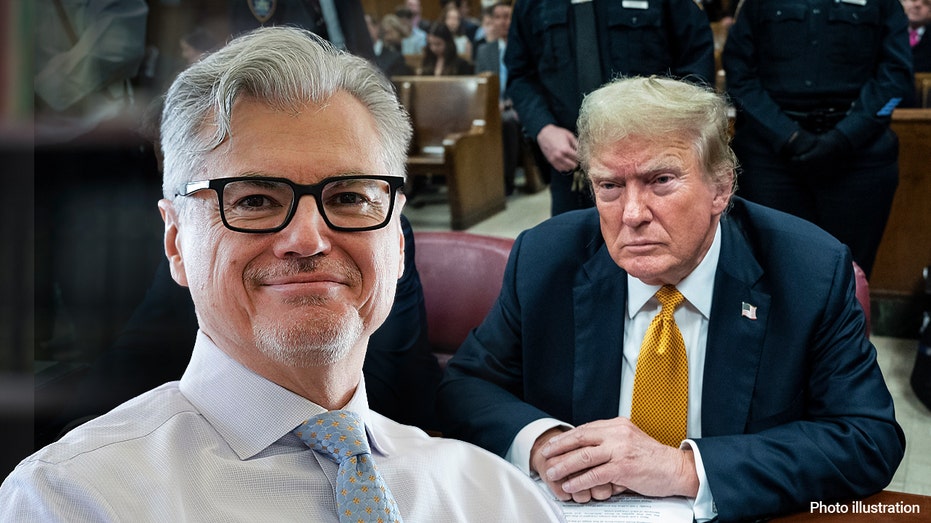ANDREW McCARTHY: Anti-Trump judge stumbles into the right decision in delaying sentencing
Legal analyst Andrew McCarthy says New York Judge Juan Merchan had little choice but to delay former President Trump's sentencing. But the judge's explanation for why he did it made no sense and continued his pattern of bias against Trump.

In postponing former President Donald Trump’s sentencing until after the 2024 election, Judge Juan Merchan did the right thing for the wrong reasons. This is apparent from his setting of a sentencing day on Nov. 26, even though – according to the four-page letter to counsel he made public today – Merchan is delaying his ruling on Trump’s immunity claim until Nov. 12.
To my mind, Trump is correct that proceeding with the scheduled Sept. 18 sentencing would have been gratuitous interference in the 2024 election. There was no rule-of-law reason why Trump, a major-party nominee, needed to be sentenced in the stretch run of the presidential campaign. And note that, until today’s postponement, Judge Merchan seemed insistent on sentencing Trump just as early voting begins (on September 16) in Pennsylvania, the most pivotal of the battleground states.
JUDGE MERCHAN DELAYS TRUMP SENTENCING UNTIL AFTER ELECTION
While Trump has been found guilty of 34 felony charges, the business-records offense is a non-violent crime that is normally a misdemeanor in New York (and normally not charged at all by Manhattan’s paragon progressive prosecutor, Alvin Bragg). And while 34 counts sounds impressive, the number is high only because Bragg unethically parsed what should have been no more than a handful of counts by charging each scrap of paper as a separate four-year felony – aggregating to 136 years of potential imprisonment!
This was done to make Trump look like a career criminal. But the offense at issue is comparatively trivial, given that, along with Trump’s lack of a criminal record, he was clearly going to get bail pending appeal regardless of what sentence was imposed. That appeal could take years to resolve, and it is probable (in my view) that the guilty verdicts will be reversed on appeal – if they are not vacated even earlier (more on that momentarily).
Hence, there should have been no rush to impose sentence prior to the election. In his letter, Merchan’s preciously protests that he is "fair, impartial and apolitical." To the contrary, he is a partisan Democrat who, as Hugh Hewitt has observed, contributed to Biden’s 2020 campaign against Trump in violation of judicial ethics laws, and whose daughter is a progressive political operative, working for Kamala Harris, among other zealously anti-Trump Democrats. For a truly apolitical judge, sentencing on Sept. 18 would have been inconceivable. The only rational reason to insist on it would be to enable Harris to label Trump "a convicted felon facing a prison sentence" in the run-up to Election Day.
All that said, though, the legal basis for the postponement should not have been the imminence of the election. It should have been the incontestable fact that, due to Bragg’s recklessness and Merchan’s indulgence of it, there is now a profound immunity issue in the case.
Over Trump’s objection, and despite the fact that the Supreme Court was simultaneously giving serious consideration to presidential immunity, Merchan permitted Bragg’s prosecutors to introduce evidence of Trump’s official presidential acts – including the testimony of two Trump White House staffers, described as "devastating" by prosecutors in their jury summation.
A month after the trial, in its immunity ruling (Trump v. United States), not only did the Supreme Court hold that presidents are immune from prosecution for official acts; the Court added that such acts may not be admitted as evidence in a criminal trial. Consequently, the contested evidence should have been precluded.
What’s more, immunity is among the few issues in the criminal law as to which a defendant is entitled to an immediate appeal – particularly a former president facing potential criminalization of his official acts. This is because, unlike other trial errors, immunity relates to whether it is (or was) proper to have a trial in the first place. Immunity questions, then, should be decided before the immune defendant is subjected to further proceedings.
That is why the postponement should have been an easy call for Merchan. This still seems lost on him, though.
In his letter, Merchan incoherently claims that there would be no need to delay the sentencing now if his original sentencing date of July 11 had held. But that date couldn’t have held. The Supreme Court’s immunity decision was issued on July 1. It was this immunity ruling, not the 2024 election, that necessitated the delay.
CLICK HERE FOR MORE FOX NEWS OPINION
Merchan also notes that even Bragg did not object to Trump’s postponement motion (in fact, he construes Bragg as having joined Trump’s motion). But the judge seems impervious to the fact that the DA took this position because Trump would be entitled to appeal if Merchan rules against him on immunity. Delay was unavoidable.
Finally, Merchan previously said he’d issue his immunity ruling on Sept. 16. Having now postponed the sentence to Nov. 26, however, Merchan somehow decided to postpone the immunity ruling until Nov. 12. That makes no sense.
If Merchan rules against Trump on Nov. 12 (as I expect he will, given the one-sided record in this case), Trump will appeal and forcefully argue that he should not be sentenced until that appeal runs its course – through New York’s appellate courts and potentially up to the U.S. Supreme Court. Obviously, there is no way that is going to happen prior to Nov. 26.
If, as he’d told the parties, Merchan was prepared to rule on Trump’s immunity claim on Sept. 16, he ought to do that. Even on such a schedule, there is no way the appellate process his ruling will trigger could be resolved in time for a Nov. 26 sentencing – and even Merchan concedes that sentencing may not happen at all if he construes the Supreme Court’s immunity ruling to require vacating the guilty verdicts. (Don’t bet the ranch on that.)
In any event, a postponement of the Sept. 26 sentencing should have been a no-brainer. Merchan finally came around to it, but awkwardly. I don’t know if Trump will win the election, but I seriously doubt he will have to cancel his Thanksgiving plans over a Nov. 26 sentencing.



